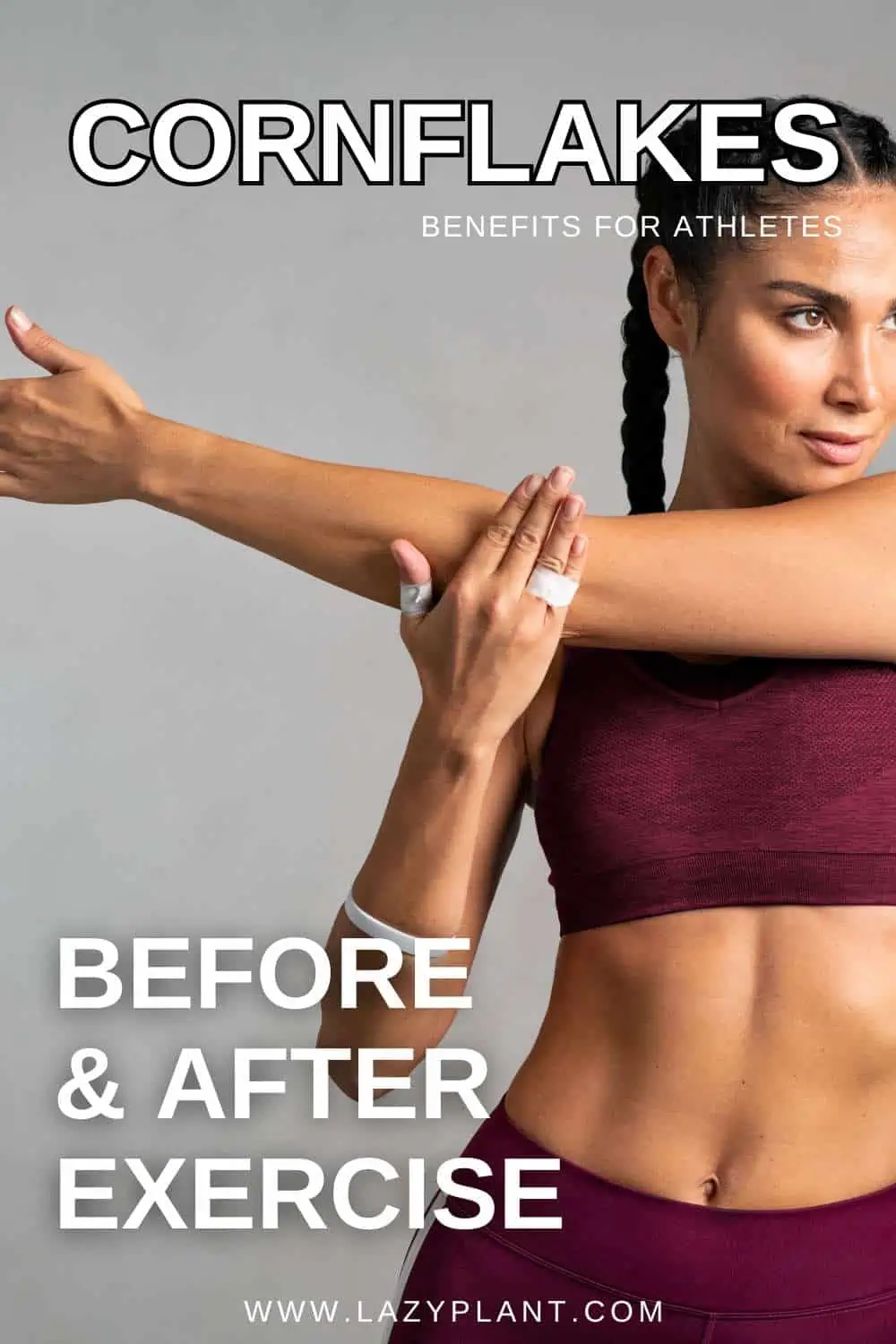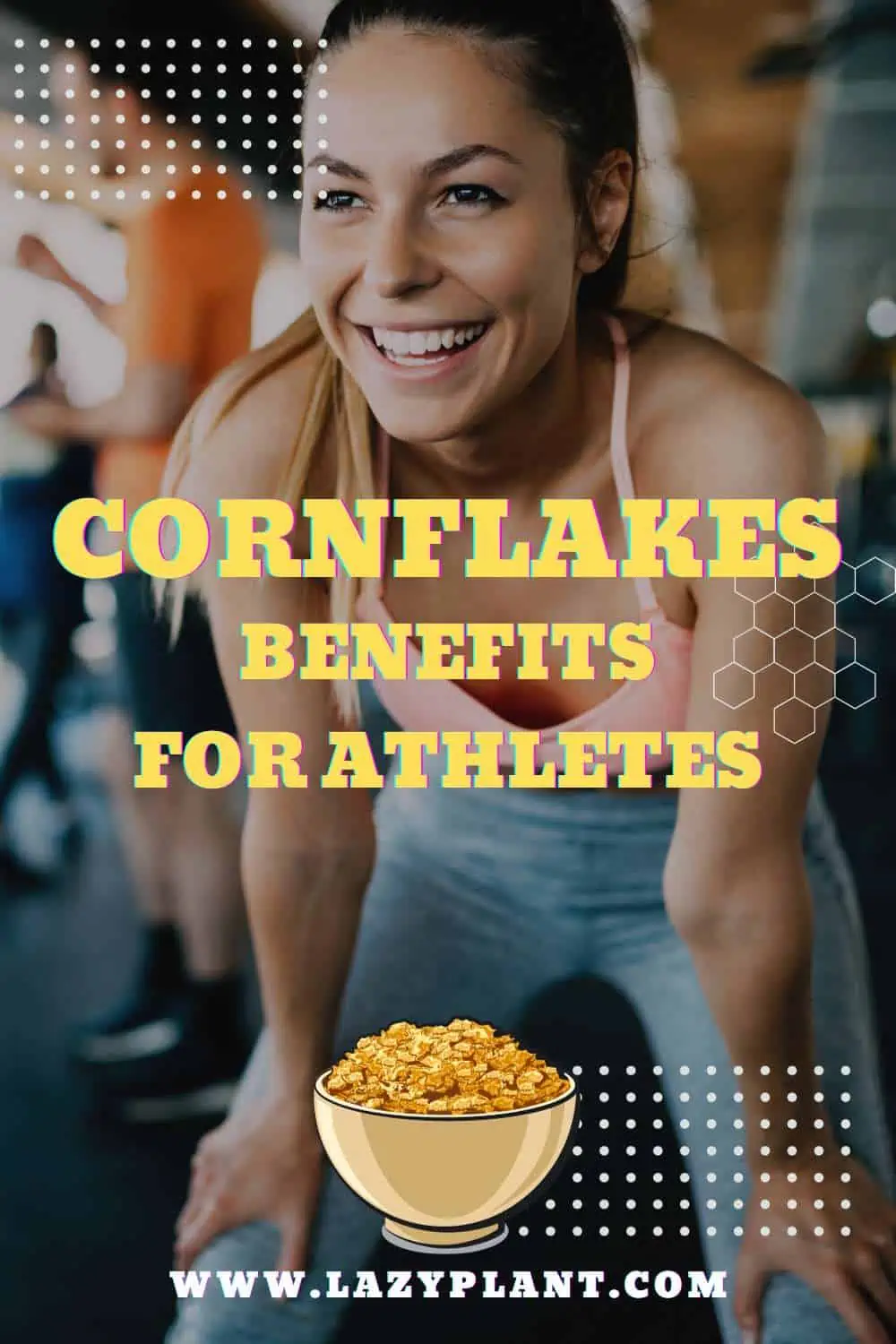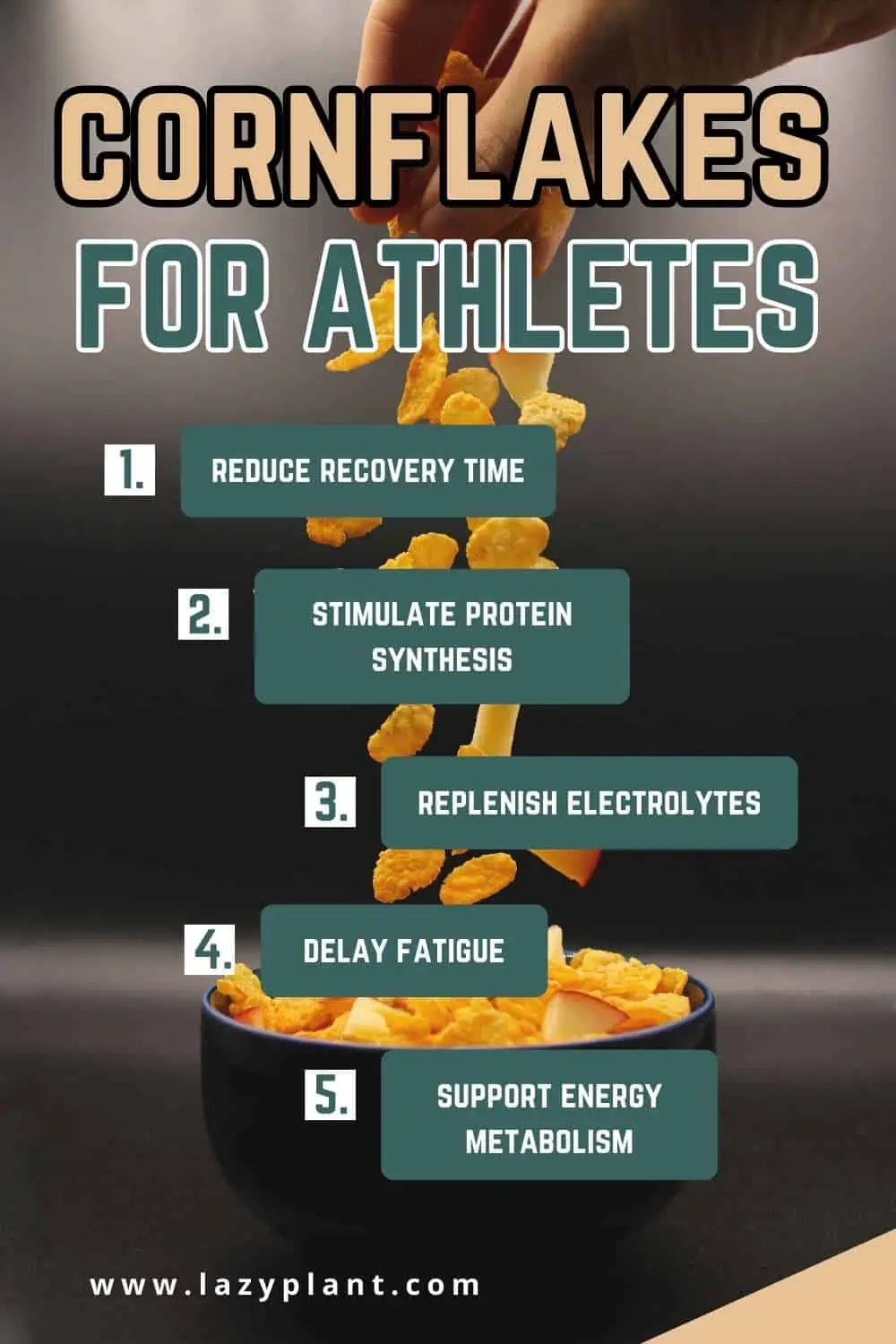Reasonable amounts of corn flakes can have many benefits for athletes. They accelerate recovery, stimulate protein synthesis, and fight fatigue, due to their high concentrations in iron, B vitamins, electrolytes, and easily digested carbs.
The best time to eat corn flakes is after the gym!
The best time of the day to eat corn flakes is after strenuous exercise. Not at breakfast. They accelerate muscle recovery and help athletes build muscle mass.
Quickly replenish muscle glycogen stores
Above all, corn flakes are a great post-workout snack because they’re packed with easily digested carbs. A small serving (a cup or 30 grams) has approximately 25 grams of carbs.[1]
Depending on the brand, a serving has between 4 and 10 grams of sugar,
But, this is a bit misleading. Most people eat a whole bowl of corn flakes, which is the equivalent of 4 servings!
Hence, a large bowl of corn flakes provides almost 100 grams of carbs and in most cases, about 20 grams of sugar!
Having meals high in easily digested carbs after a workout is crucial for fast recovery. As the body has increased insulin sensitivity after exercising, it easily stores carbs as muscle glycogen.
Replenishing depleted muscle glycogen stores as soon as possible substantially accelerates recovery.
Actually, the best time of the day to enjoy your sugar-packed food or beverage (e.g. candy, Coke) is right after exhaustive exercise!
Thiamine accelerates recovery
Furthermore, corn flakes support muscle recovery because they’re usually packed with thiamine. A small serving provides between 14 and 45% of the Daily Value.
Hence, a large bowl of corn flakes can provide more thiamine than we actually need in a day!
This B vitamin plays an important role in muscle recovery. High dosages may prevent exercise-induced fatigue![2]
Also, athletes should follow a diet high in thiamine because it’s important for energy metabolism. If you feel lethargic, you may have low thiamine levels. Strenuous exercise depletes thiamine stores.[3]
A continuous supply of this vitamin is necessary for the best athletic performance.
Hydrate the body
It’s absolutely vital for good health, a lean body, and optimal physical performance, to maintain a well-hydrated body.
Drinking water isn’t enough. We have to replenish both lost electrolytes and fluids after exercise. Otherwise, electrolyte imbalances may occur, leading to serious adverse effects, including leg cramps!
A small serving of corn flakes has some electrolytes:
- potassium, 1% DV
- magnesium, 2% DV
- phosphorus, 3-4% DV
- sodium, 9% DV
As a large bowl of corn flakes contains 3–4 servings, corn flakes contribute to the replenishment of lost electrolytes.
After all, corn flakes are usually consumed with milk. Skim milk contains decent amounts of electrolytes as well. An oz provides phosphorus (4% DV), potassium (1.5% DV), and magnesium (1% DV).
Above all, just an oz of skim milk provides 6% DV of calcium, which is another key electrolyte.
Why should runners & other endurance athletes eat corn flakes?
Runners and other long-distance endurance athletes could highly benefit from the regular consumption of corn flakes.
Iron
Above all, corn flakes are excellent dietary sources of iron. A serving provides 16-23% of the DV.
A normal iron status is crucial for endurance athletes. Among other benefits, iron is necessary for oxygen transport and energy metabolism! Sports performance is highly associated with iron regulation.
However, iron deficiency is pretty common among female endurance athletes. It’s estimated that up to 35% of female endurance athletes have low levels of iron.[4,5]

Common causes of iron deficiency among athletes are:
- poor diet
- foot strike hemolysis; when running, your feet may hit the ground so hard that red blood cells break open.
- thermohemolysis; the breakdown of red blood cells due to heat.
- sweat losses
- menstrual losses
Goji berries are the richest fruits in iron. You can eat them with your favorite cereals.
Niacin
Also, corn flakes are excellent sources of niacin. A serving provides 13-30% of the DV.
Niacin plays a crucial role in endurance performance. It enhances glycogen concentration in the muscles and helps the body obtain energy from the food.[6]
Peanut butter is one of the richest foods in niacin.
A peanut butter and jelly sandwich is another great post-workout snack.
Riboflavin
Corn flakes are also high in riboflavin. A serving provides 12-53% of the DV.
High riboflavin intake before prolonged running might reduce muscle pain and soreness during a race.[7]
In addition, riboflavin supports early functional recovery after a workout. It exhibits potent antioxidant properties, protecting tissue from oxidative damage.
Hence, endurance athletes could eat corn flakes before or after a big race. Not only do they fuel up the muscles, but also they help us run for longer.
Protect the heart of athletes
Furthermore, certain B vitamins in corn flakes protect the cardiovascular system of endurance athletes.
Vitamin B6 (18-32% DV) and folate (folate 11-25% DV), in particular, which are found abundant in corn flakes, regulate homocysteine levels.

Homocysteine is an amino acid that can be dangerous for the cardiovascular system if concentrated in high amounts in the blood. High training volume or acute intense exercise increases homocysteine concentration.[8]
Hence, athletes should eat various foods rich in B vitamins. like corn flakes, before a big race or exhaustive workouts.
Benefits of corn flakes for bodybuilders
Bodybuilding athletes can benefit from the regular consumption of corn flakes as well.
Vitamin B12
Corn flakes are also enriched with vitamin B12. A serving provides 11-31% of the DV.
Bodybuilding athletes should be very cautious with their vitamin B12 status. Maintaining healthy levels is crucial for muscle gain and strength, as well as proper neurological function.
However, vitamin B12 deficiency is common among athletes. Among others, it can cause fatigue, impaired athletic performance, and muscle soreness.
Vitamin B12 supplementation could have excellent results in a case of acute deficiency.
Corn flakes enhance muscle gain
Vitamin B6 (18-32% DV) in corn flakes not only protects the cardiovascular system of athletes but also it’s involved in more than 100 enzyme reactions, mostly concerned with protein metabolism.
Also, it modulates the production of glucose. When the body has increased energy needs, this can be particularly beneficial.
Additionally, corn flakes are eaten with milk or yogurt, which are rich in protein! A meal high in both protein and easily digested carbs after the gym enhances muscle hypertrophy.
How many corn flakes should an athlete eat a day?
Athletes with higher energy requirements can consume 3–4 servings of corn flakes per day, which is roughly the amount you’d find in a bowl.
This serving size has 360–480 calories, without counting the extra calories of milk. Skim milk has about 35 calories per 100g or 86 calories per cup (240 grams).
Bodybuilding athletes in the cutting phase who work out for a lean body better consume only 1–2 servings of corn flakes a day. Half a bowl of corn flakes with skim milk has about 280 calories.
Are corn flakes healthy?
Actually, no. Corn flakes are rich in refined flour, sugar, and salt, while they’re low in fiber. A serving provides only 3-6% of the recommended daily intake of fiber.
Hence, corn flakes aren’t the healthiest food option for you. Consider them more like candy than healthy whole-grain cereals.

Certainly, reasonable amounts, as part of a healthy, well-balanced diet, can be beneficial for sports performance. They could even help lose weight if properly eaten.
Healthier alternatives to corn flakes are oats or muesli.
How to eat corn flakes for better athletic performance?
You can enjoy corn flakes in many ways.
For instance, instead of milk, you could consume them with kefir. It has huge benefits for athletic performance, as kefir is the richest common food in probiotics and has a superior nutritional value.
Also, you could enjoy corn flakes with nonfat Greek yogurt, which is a good dietary source of highly absorbable protein.
Moreover, you could eat a handful of dry corn flakes before your workout. You could add your favorite dried fruits for extra energy and antioxidants.
Prefer eating your pre-workout snacks at least 11/2 hours before exercising. Otherwise, people with a sensitive stomach may experience adverse effects, like stomach cramps or bloating.